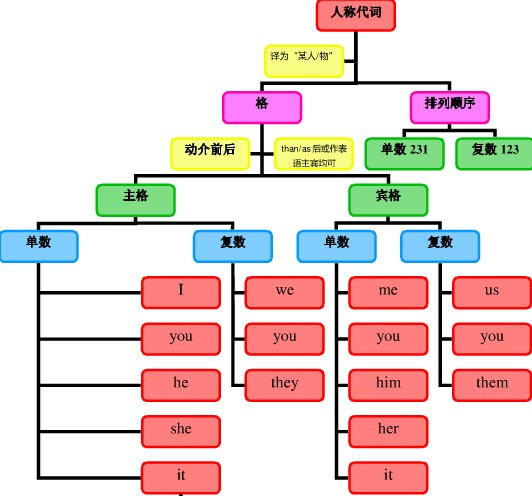本试题 “Someone is ringing the doorbell. Go and see _____.A. who is heB. who he isC. who is itD. who it is” 主要考查您对人称代词
宾语从句
等考点的理解。关于这些考点您可以点击下面的选项卡查看详细档案。
- 人称代词
- 宾语从句
人称代词的概念:
人称代词是替代我、你、他、她、它、我们、你们、他们、她们、它们等人称的词。
人称代词分为主格和宾格形式,并有人称的单复数形式。按所替代人称的不同分为第一人称、第二人称和第三人称。
人称代词的用法:
人称代词在句中可以用作主语(用主格,如:I,you,he,she,we,they,等)和宾语(用宾格,如 me,you,him,her,us,them等)
如:He loves her, but she hates him. 他爱她,但她却讨厌他。
注:(1)在口语中,当人称代词用作表语、用于than, as之后或用于强调句中被强调时,可以用语。 例如:
"Who is it?" "It's me."“是谁呀?”“是我。”
He sings better than me. 他比我唱得好。
He is as tall as her. 他和她一样高。
It's me who did it. 这是我干的。但是,若than,as后的人称代词后跟有动词,则必须用主格。例如:
He sings better than I do./ He is as tall as she is.
(2)单独使用的人称代词通常用宾格。
"I' m tired.""Me too."“我累了。”“我也累了。”
"Who wants this?" "Me."“谁要这个?”“我要。”
(3)有时用主格或宾格会导致意思的变化。
I like you better than he. 我比他更喜欢你。为 I like you better than he likes you. 之略。
I like you better than him. 我喜欢你胜过喜欢他。为 I like you better than he likes him. 之略。
人称代词主格、宾格、人称、单复数对比:
|
人称代词 |
单数 |
复数 | ||
|
主格 |
宾格 |
主格 |
宾格 | |
|
第一人称 |
I |
me |
we |
us |
|
第二人称 |
you |
you |
you |
you |
|
第三人称 |
he |
him |
they |
them |
|
she |
her |
them | ||
|
it |
it | |||
人称代词的排序:
人称代词的排列顺序为:单数人称代词通常按“二三一”排列,即you, he and I;复数人称代词通常按“一二三”排列,即we, you and they:
You, he and I are of the same age. 你,他和我都是同一年龄。
We, you and they are all good citizens. 我们,你们和他们都是好公民。
但若是用于承担责任或错误等场合,则可把第一人称I置于其他人称代词之前:
I and Tom are to blame. 我和汤姆该受批评。
比较:Tom and I hope to go there. 汤姆和我想去那儿。
注意:you and I 是固定结构,语序通常不宜颠倒。
人称代词知识体系:

人称代词用法拓展:
1、在通常情况下,人称代词在句子中出现在它所代替的名词之后,即先出现名词,再出现相应的代词。但是,在书面语中,有时也可出现代词,后出现代词所代替的名词。
As soon as it had hopped off, the plane picked up speed.飞机刚一起飞,就加了速。
(比较:As soon as the plane had hopped off, it picked up speed.)
2、人称代词后跟名词同位语。有些人称代词后有时可跟同位语。
These small desks are forus students.这些小课桌是给我们学生的。
We girls often go to the movies together.我们女孩子常一起去看电影。
He asked you boys to be quiet.他要你们男孩子安静些。
宾语从句的概念:
置于动词、介词等词性后面起宾语作用的从句叫宾语从句。宾语从句的语序必须是陈述语序。谓语动词、介词、动词不定式,v.-ing形式后面都能带宾语从句。有些形容词(afraid, sure, glad等)之后也可以带宾语从句。
宾语从句的用法:
1、宾语从句的引导词:
宾语从句通常由连词that和whether(if)、连接代词或连接副词以及关系代词型what引导:
如:We believe that he is honest. 我们相信他是诚实的。
I don't know whether he'll arrive in time. 我不知道他是否能及时到。
I don't know who(m) you mean. 我不知道你指谁。
He asked why he had to go alone. 他问他为什么必须一个人去。
Please tell me which you like. 告诉我你喜欢哪一个。
She has got what she wanted. 她要的东西得到了。
注:有时介词后可接跟一个宾语从句(但介词后通常不接that和if引导的宾语从句):
如:From what you say, he is right. 根据你所说的,他是对的。
有极个别介词(如but,except)可接that引导的宾语从句:
如:She remembered nothing about him except that his hair was black. 她对他什么都不记得,只记得他的头发是黑的。
2、宾语从句与形式宾语it:
当宾语从句后跟有宾语补足语时,通常在宾语从句处使用形式宾语it,而将真正的宾语从句移至句末:
如:I think it best that you should stay here. 我认为你最好住这儿。
He hasn't made it known when he is going to get married. 他还没宣布他何时结婚。
3、连词that的省略问题:
引导宾语从句的连词that通常可以省略:
如:She said(that) she would come to the meeting. 她说过要来开会的。
I promise you(that) I will be there. 我答应你我会去。
注:有时为了强调,that引导的宾语从句可位于句首,此时that不可省略:
如:That she is a good girl I know. 她是一个好姑娘,我是知道的。
4、宾语从句与否定转移当动词think, believe, suppose, expect, imagine后接一个表示否定意义的宾语从句时,其否定通常转移到主语:
如:I don't suppose that it is true. 我认为那不是真的。
I don't imagine that he will come. 我想他不会
使用宾语从句特别注意:
一、宾语从句的语序:
宾语从句的语序是陈述句语序即:连接代词/副词+主语+谓语+其他成分。
如:I don't know what they are looking for.
Could you tell me when the train will leave?
Can you imagine what kind of man he is?
二、宾语从句的时态:
主句是一般现在时,从句根据实际情况使用任何时态。
句:The headmaster hopes everything goes well.
主句是过去时态,从句须用过去时态的某种形式。
句:She was sorry that she hadn't finished her work on time.
当宾语从句表示的是一个客观真理或者事实时,即使主句是过去时,从句也用一般现在时态。
如:The teacher told his class that light travels faster than sound.
三、宾语从句的特点:
宾语从句可以作及物动词、介词及形容词的宾语。宾语从句的语序一律用陈述句语序。连接词that引导宾语从句在句中无词义,不充当句子成份,多数情况下可以省略。whether和if都可引导宾语从句,但whether后可紧跟or not;whether从句可作介词的宾语。如果从句太长,可以用形式宾语it.
与“Someone is ringing the doorbell. Go and see _____.A. who ...”考查相似的试题有:
- 短文改错。此题要求改正所给短文中的错误。对标有题号的每一行作出判断:如有错误(每行只有一个错误),则按下列情况改正:此...
- 短文改错。假定英语课上老师要求同桌之间交换修改作文,请你修改你同桌写的以下作文。文中共有10处语言错误,每句中最多有两...
- ____ road may lie ahead, that road will take me home.A.WhatB.ThatC.WhichD.Whatever
- He is a strict but kind-hearted father, ____ the children respect but are afraid of.A./B.thatC.for whomD.one whom
- I get the bicycle for _____.My friend gave it to me when she bought a new one.A.everythingB.somethingC.nothingD.a...
- I hear __________ boys in your school like playing football in their spare time, though others prefer basketball.A.q...
- Nobody but me ______ that either you or Tom ______to take part in this activity.A.knows / isB.know / areC.know / i...
- I like _______ in the autumn when the weather is clear and bright.A.thisB.thatC.itD.one.
- I don’t think ____ possible to master a foreign language without much memory work.A.this B.thatC.itsD.it
- He has learned________,no matter what happens and how bad________seems today,life goes on and it will be better tomor...